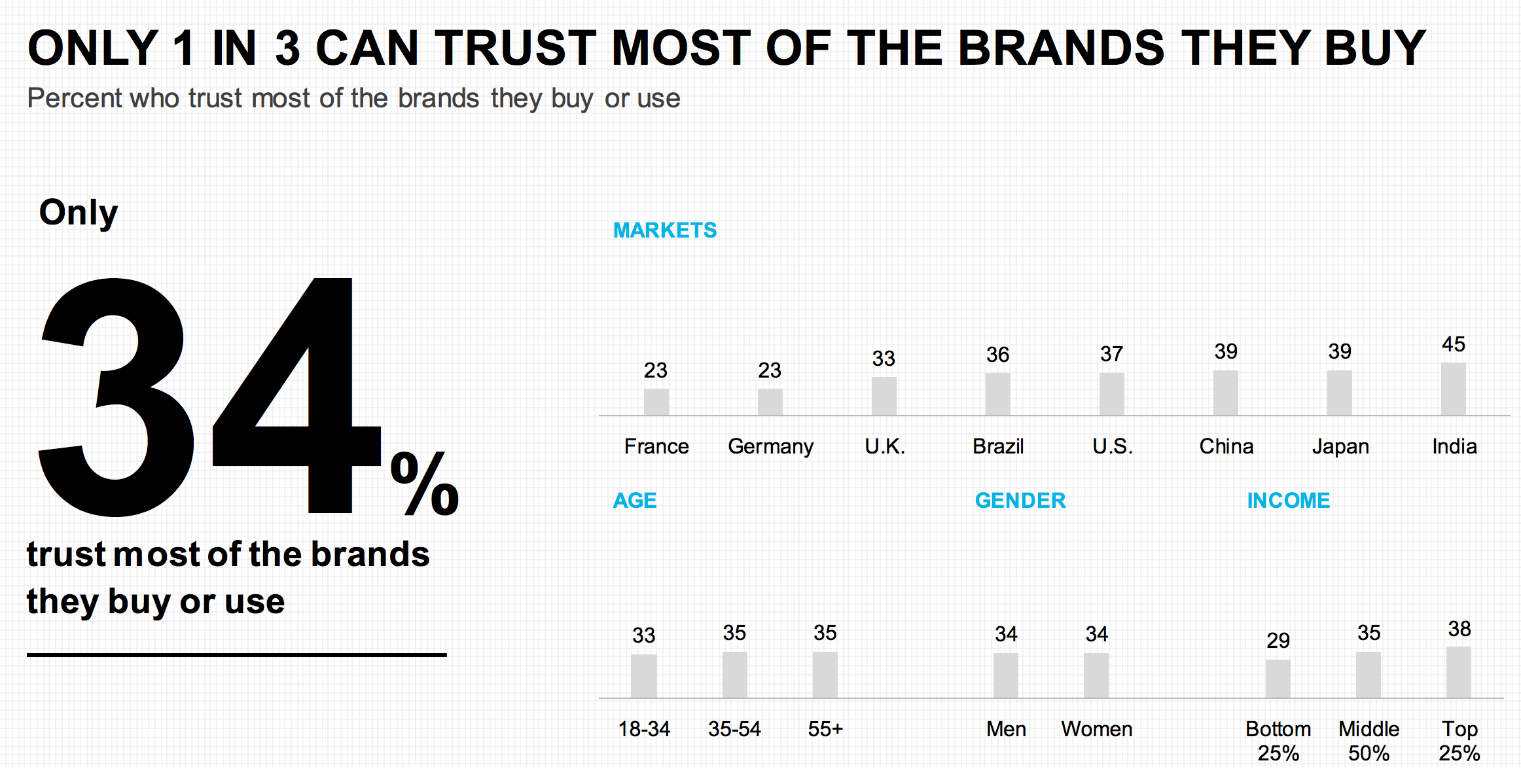(The article Build Customer Trust By Avoiding These Mistakes was first published on ExperienceInvestigators.com. Re-published at AnswerDash by the permission of the original author.)
Success Relies Upon Customer Trust
When I ask you a question like, “What brand are you loyal to?” you are actually answering the question “What brands have earned your trust?”
What brand has proven, time and again, they can live up to their promises? Which brand hasn’t disappointed you? Which brand delivers on their expectations?
It’s all about trust.
In fact, Edelman’s 2019 Trust Barometer report shared that while 81% of customers say trust is essential in their buying decision, only 34% of us trust most of the brands we buy or use. 34%!!!
This means that there’s a huge advantage to be gained simply by building up greater brand trust with your customers.
Unfortunately, rather than take advantage of this opportunity, I often see brands making mistakes that hurt their ability to build trust — sometimes even before starting the customer relationship.
Are you guilty of slowly chipping away at the trust you have with customers?
To Build Customer Trust, Stop Making These Mistakes:
Here are a few things your customers (and those who haven’t become customers) want you to know.
1. Stop adding me to email lists without permission.
Small business owners, real estate agents, and even my beloved fellow keynote speakers and trainers…time to sit up and pay attention.
Giving you my business card in a friendly environment does not imply permission to get your newsletter that doesn’t apply to me. It shows me FROM THE JUMP you are interested in selling to me, not really knowing me.
2. Speaking of selling…stop sending me LinkedIn pitches and then replying “what do you think” after no response after 5 attempts.
You guys. This has gotten ridiculous. I understand we all need to sell things, but I’m not going to buy your product if I don’t even understand the way you’re discussing it, let alone making no effort to understand me or my world.
If you want a customer, build a relationship.
3. Please understand your brand promise.
I see your brand as fun and agile, based on the voice of your marketing campaigns and tagline. Why do I find myself in a dated, unorganized store if I visit your retail location? Why is the process of buying from you so slow and cumbersome?
I feel duped. You presented one brand and switched it for another!
4. Don’t make me regret my purchase within minutes.
You gained enough of my trust to get me to sign on the dotted line! But now you tell me you can’t deliver my item for another three weeks or I need to actually purchase another part or software to make it work. I feel lied to and disappointed.
5. Stop yelling at me on my invoice.
I pay my bills on time and STILL get a stern talking to when I pay my monthly invoice automatically. Thanks for implying I might be a criminal and letting me know all the terrible things you’ll do to me IF I decide to pay late or not at all.
It’s ok to have the legal mumbo-jumbo to protect your brand, but it’s ALSO ok to acknowledge loyal customers in this moment. Invoices are inherently negative touchpoints, so why not look for ways to make the whole experience a smidge better?
Otherwise, you’re implying – over and over – that you don’t trust ME, when I’ve done nothing but act appropriately to earn that trust.
6. Live up to the values you say you have
It’s great to produce a shiny new commercial all about how you care about the environment or support women or whatever. It’s then very much expected that your own behaviors and actions live up to those values.
The authenticity of brands is becoming a decision point for customers. They stay or go based on if the brand has integrity as they define it. This means knowing your values and being crystal clear on the ways you live up to them.
7. Don’t rely on “washing” the truth
In today’s world, there are no secrets. It’s not acceptable to paint the same product pink and say it’s for women to charge twice as much. It’s not ok to “pinkwash” your brand to appear LGBTQ+ friendly but not have actions in place to live up to that support.
Finding out what’s really going on no longer requires investigative reporting. A few clicks on the internet is typically enough to determine if your brand is walking the talk. Customers don’t want to feel like they are part of the deception by supporting your efforts. They want to know exactly who your brand is and how they can align with companies that share their values.
8. What happens in your workplace…goes on Glassdoor and Google
Glassdoor Customer Trust EffectGuess who cares about how you treat your workers? Your customers. They want to know the staff is treated fairly and well.
Another important point here is how happier employees are better for your customer experience. Engaged workers are better for your bottom line AND customer loyalty and engagement. According to Gallup, brands with the highest employee engagement can deliver as much as 21% higher profitability than their competitors who don’t.
And your customers care about this. So don’t assume your employee experience and your customer experience can be different. That looks like a reason to distrust you as a brand.
9. Finally, don’t be a jerk when you don’t need to be.
Trust means that I know you’ll do the right thing.
Don’t nod your head about a customer process that you know isn’t great. Don’t sacrifice my experience as a customer because it makes you a few extra pennies through deception or lack of attention. Treat me the way you would want to be treated.
The relationship your brand has with customers is like any other relationship. You need to provide reasons to earn trust, avoid reasons to doubt it, and provide enough moments of happiness that the relationship is worth it to the other person.
How are you building trust with your customers? How are you chipping away at it? These are the questions we need to be asking. If you are trying to only live up to “surprise and delight” then you are probably missing opportunities to earn trust on a regular basis.
I hope you know your customers aren’t trying to scold you, brands. They are expecting you to do the right things. At its core, building customer trust is really just a matter of living up to your values and doing what you promise to do.
That’s not so bad, right? We should expect that from ourselves.
This article was written by Jeannie Walters:
Jeannie Walters is the CEO/Founder of Experience Investigators™ by 360Connext, a global Customer Experience consulting firm. She has 20 years of experience helping companies improve loyalty and retention, employee engagement, and overall customer experience. Read more about her on Experience Investigators.
Effectively Build Customer Trust With AnswerDash
Two important components of building customer trust? Appearing where and when your customers want to hear from you (not through unsolicited emails or LinkedIn messages) and creating positive, transparent communication throughout their engagement with your brand.
AnswerDash can help with both.
AnswerDash’s AI-powered Q&A helps you gather useful data from your customers and turn that information into predictive Q&A that actually answers their questions and solves their pain points directly at their point of need. No confusion, no frustration, and no more failing to meet their expectations.
That way, you can actually start putting your customers first and improving their overall customer experience. It sounds like a win-win situation, right?






